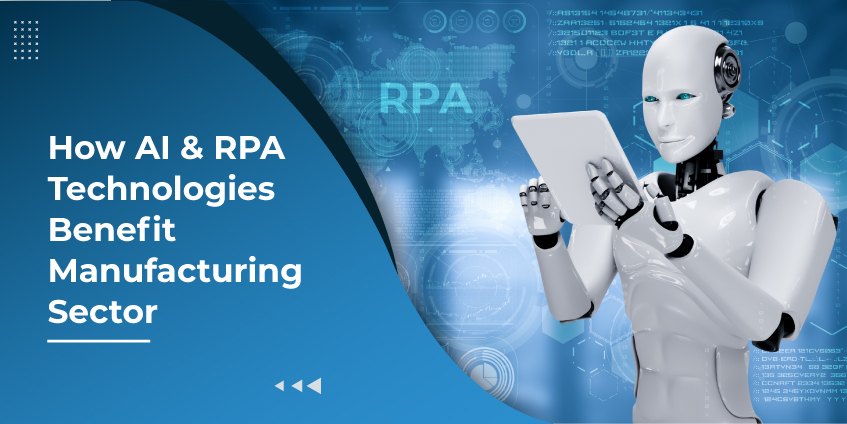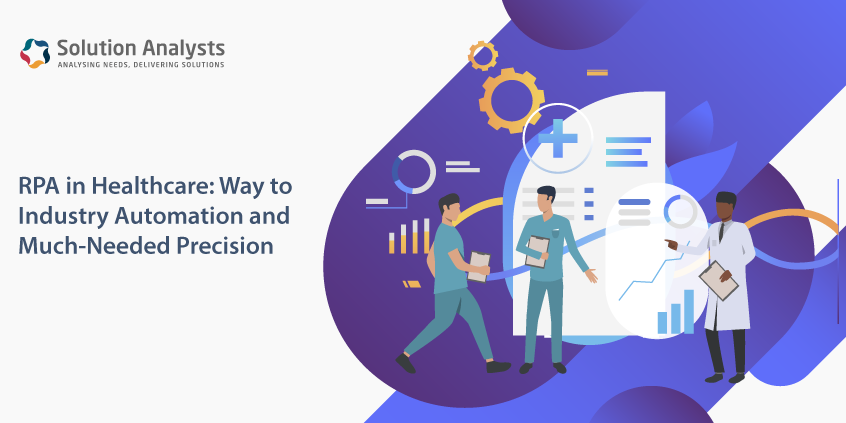
Table of Contents
The massive transition of business processes due to digital transformation has paved the way for companies to rapidly adopt advanced technologies. Two of these emerging technologies are AI and RPA which are key enablers of end-to-end automation in the manufacturing sector.
Automation has become an important part of business operations worldwide to keep pace with the rapidly changing markets. In today’s times, enterprises cannot afford to spend days and hours on tasks that can be easily performed within minutes and seconds with the help of the AI-RPA combination.
The combination of Robotic Process Automation (RPA) and Artificial Intelligence (AI) leads to Intelligent Automation (IA). It allows enterprises to fully automate complex work processes by integrating technological advancements. The biggest benefit of AI and RPA combination is that it frees employees from the repetitive tasks of core business processes.
Before moving forward, let’s look at the role of AI and RPA in manufacturing separately.
Role of RPA in Manufacturing
Manufacturing enterprises are gradually replacing human resources in production units with physical industry-specific robots. The RPA-based robots perform critical tasks such as product assembling, quality checking, and packing. Implementation of RPA bots can reduce manual errors, minimizes human resources, and enhances productivity. Integration of RPA development services in back-end operation empower the enterprise to attain an exponential rate of cost savings in various process of work ranging from product price comparisons, ERP automation, and logistic data automation. RPA tools and software offer a wide variety of benefits in the manufacturing domain.
Role of AI in Manufacturing
Artificial Intelligence has become on top of the list of advanced technology as it can transform operations, improve product quality and reduce costs through various methods such as smart operation, design prediction, quality assessment of products, and more. AI allows enterprises to alter business models, invent operational plans to support those models, and monetize information for achieving productivity. Manufacturing industries mostly utilize Artificial Intelligence to increase overall equipment efficiency and results. It is also utilized to improve productivity, quality, and consistency, which helps manufacturers forecast accurately about business and it’s other aspects for the future.
Also Read- Artificial Intelligence: The Impact on the Top Industries in 2022
After seeing the importance individually, let’s go through the top benefits of the AI-RPA combination in manufacturing.
Top Benefits of AI and RPA in Manufacturing
Nowadays, “automation” and “manufacturing” go hand in hand. Manufacturers look for ways to automate various small and big tasks which deliver value for customers. In recent times, Artificial Intelligence and Robotic Process Automation services have significantly impacted the manufacturing core process leading to better results. Combining AI and RPA can accelerate the digital transformation of enterprises.
Read on further to explore the benefits of the AI-RPA combination in manufacturing.
-
Valuable Data Collection
Performing massive business processes across multiple software makes it difficult to keep track of data. Generally, employees do not have complete visibility about how or by whom the tasks are accomplished. Such situations can be prevented by a centralized hyper-automation platform as achieved by the AI-RPA combination which creates audit trails of tasks.
It collects and organizes new process data that enables managers to prevent obstruction and explore further opportunities for optimization. This enhanced data collection can also simplify compliance in regulated industries such as insurance, financial services, healthcare, etc. which saves time and associated costs.
-
Streamlined Inventory Management
Inventory plays a vital role in supply chain management. Manufacturers and suppliers need to track inventories so that they can meet customers’ demands. Scheduling the restocking inventories requires continuous monitoring as warehouse space availability is also taken into consideration.
Manufacturers utilize software bots regularly to check vehicle tracking systems and websites for retrieving inventory status. These bots can also be configured for matching the data with the original order in the warehouse management system. It helps in better tracking and giving faster responses to customer inquiries. If the inventory is about to end, bots can trigger the restocking order.
-
Enhanced Reconciliation
Detailed heavy and high-volume reconciliation are core aspects of manufacturing that can be time-consuming and tedious. Integrating software bots in this process can facilitate the reconciliation of transactions in minutes by getting into multiple systems. Automation can prevent the manual task of filling spreadsheets and looking for any possible discrepancies. Software bots can generate reports of matched and unmatched transactions rapidly and save the time that could have been spent on manual reconciliation.
-
Improved Procure to Pay (P2P) Process
Any manufacturing activity requires procuring raw materials and other goods. There are several aspects of Procure to Pay process such as performing vendor assessment, updates in ERP, good’s receipts, purchase orders, invoicing, and payments.
Enterprises utilizing automation can carry out the P2P process seamlessly. Only negotiation and decision-making will be up to humans while the rest will be implemented via automation. It will boost productivity and reduce the turnaround time of task completion. Automated P2P also improves accuracy which reduces rework and operating costs.
Conclusion
Manufacturing is a highly labor-intensive industry. It used to burden with lots of manual processes, which create problems in inventory control and managing several unpredictabilities in delivery against customer demand. Integration of Artificial Intelligence and Robotic Process Automation in manufacturing can help enterprises to focus more on product innovation and core strengths instead of involving in mundane and repetitive tasks.
Solution Analysts is a leading Artificial Intelligence and Robotic Process Automation services provider. We also offer customized manufacturing app development services in various industry sectors to improve customer engagement which enhances support services and processes.












 sales@solutionanalysts.com
sales@solutionanalysts.com solution.analysts
solution.analysts






